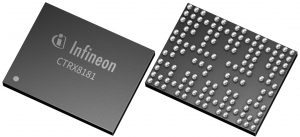Infineon introduces new CMOS transceiver MMIC CTRX8181 for automotive radar

Munich, Germany. 3 November, 2022 – A high-performance and reliable radar module is the key to an improved automated driving assistance system and autonomous driving in the future. New features, such as advanced emergency braking systems (AEBs) that react to crossing motorcyclists, will demand higher performance and increased modules per car. Key drivers for this growth are NCAP programs and legislation.
Infineon Technologies AG is in the market for over 15 years and is the producer of radar monolithic microwave integrated circuits (MMIC). The company pioneered the transceiver integration (transmitter + receiver in one chip) and launched the world‘s first 77 GHz automotive radar chip based on SiGe in 2009. Infineon products address all market segments, from short range radar (corner radar) to the premium segment for front radars.
Today, Infineon announced the RASIC CTRX8181 transceiver its next innovation radar and first product in a series of new 76 to 81 GHz radar MMICs based on 28-nm CMOS technology. The improved signal-to-noise ratio and linearity of the transceiver provides high system-level performance and resilience. In addition, the easy-to-use radar transceiver simultaneously offers a scalable platform approach for different sensor including corner, front and short range, along with flexibility for new software-defined-vehicle architectures. This enables 77 GHz automotive radar applications at reduced development costs.
“The new CTRX8181 transceiver enables a reliable object separation and detection necessary for protecting vulnerable road users including motorcyclists, cyclists or pedestrians,” says Tomas Lucia, head of product marketing radar MMIC at Infineon’s Automotive Division. “The increased RF performance is a prerequisite for the successful deployment of dependable assisted and automated driving functions for all SAE levels, up to Level 4.”
The CTRX8181 is developed according to the latest ISO26262 safety standards and comes with 4 transmit and 4 receive channels. The device offers excellent signal-to-noise ratio (SNR) and increases the standard module range by up to 25% (e.g. from 250 to more than 300 metres). The higher RF-channel count with improved linearity also enables 33% higher vertical or angular resolution to allow a better separation between different objects like pedestrians next to cars. These features contribute to the development of radar modules for all applications from corner radar to high-resolution radar.
The in-chip digital phase-locked loop (PLL) allows faster ramps for better range resolution and ultra-fast fly back times, improved by the factor four compared to today’s best solutions. This new feature reduces power consumption and enables better accurate speed information required to separate objects at similar speeds. This also allows a completely free configurable ramp without compromising phase noise making the radar robust and reliable in different scenarios. This makes it perfectly prepared for interference robust frequency schemes, like compass method.

The new CTRX product family is best combined with Infineon’s radar specific AURIX microcontrollers (MCUs) TC3x and upcoming TC4x, both with integrated signal processing units (SPU) and non-volatile memory for on-chip program code storage. The AURIX™ chipset and CTRX enable the best performance for future NCAP and real-world scenarios such as improved reliability for radar function in bad weather conditions.
The system partitioning gives vendors the flexibility to offer traditional solutions with full processing capabilities in the radar but also allows different architectures such as pre-processed data streaming over 100 Mbit/s or 1 Gbit/s Ethernet with minimal effort. The splitting also allows the selection of appropriate MMIC and microcontroller for target applications to enable easy scaling to support various cost and performance requirements. The connection to the MCU is established via either LVDS or CSI-2 to enable greater flexibility to combine components.
Availability
Engineering samples of the new CMOS MMIC CTRX8181 transceiver are available and will be presented at electronica 2022 in Munich, Germany. More information is available here.
Comment on this article below or via Twitter @IoTGN
